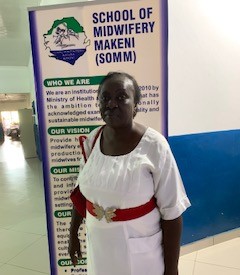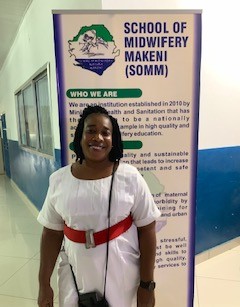MAKENI, Sierra Leone, 3 September 2019 - Sierra Leone has one of the highest maternal mortality ratios in the world (1,165 deaths per 100,000 live births). Poor accessibility and low utilisation of services by skilled birth attendants make Sierra Leone one of the most unsafe places for women to deliver. One of the key interventions to averting maternal and newborn mortality and morbidity is ensuring that quality midwifery services are available, accessible and utilized throughout the country. To accomplish this, a complex system of challenges needs to be addressed, namely increasing the number of skilled birth attendants in the country, better distribution of these skilled birth attendants, and strengthening the quality of care they provide.
Additionally, ensuring that midwives have the skills required to provide quality Basic Emergency Obstetric and Neonatal Care (BEmONC) has also proven to be of key importance in reducing deaths and disabilities of mothers and newborns. However, there is often a lack of key BEmONC competencies among midwives in low and middle-income countries such as Sierra Leone.
The Maternity Foundation in partnership with Copenhagen University and the University of Southern Denmark, developed an innovative mobile training tool called The Safe Delivery App, which offers the opportunity to midwives and other health professionals to improve their BEmONC competencies. The Maternity Foundation capitalizes on the massive access to mobile phones in low and middle-income countries as the conduit for making the app available to trainees. Through simple, animated clinical instruction, films and action cards, the Safe Delivery App guides skilled birth attendants on how to manage both normal and complicated deliveries.
The Safe Delivery App is currently used across 40 low-and-middle income countries in Southeast Asia and Sub-Saharan Africa. Evidence shows that health workers using the Safe Delivery App significantly improve skills, knowledge, and confidence in identifying and managing obstetric complications.
Implementing the Safe Delivery App in Sierra Leone
In September 2018, sixty midwives from four districts in Sierra Leone; Western Area, Bombali, Bo and Kenema, received training in the use of the App by trainers from the Maternity Foundation with the support of the Ministry of Health and Sanitation, funds from UKaid, and sponsored by UNFPA. The participants received an introduction to the Safe Delivery App and its applicatory benefits. The midwives received the Safe Delivery App either on their personal phones or a tablet on loan from UNFPA (assigned to their designated facility), and learned how and when to use the tablet.
Impressively, by June 2019, three midwives in Sierra Leone had been able to go beyond mastery of the App to undertake and pass the certification exam administered by the Maternity Foundation on the App to become “Safe Delivery Champions”.
Safe Delivery Champions – Elizabeth Davies and Catherine Swaray: “We are proud of the work we do”
Elizabeth's story

Elizabeth Davies at the School of Midwifery Makeni ©UNFPA Sierra Leone/2019/Karen Davies
Elizabeth Davies was selected for training by the District Health Sister because of her outstanding record as a midwife in Binkolo Community Health Centre. By following the ‘My Learning’ platform on the App, answering all the questions correctly, and applying the knowledge and skills in her day-to-day work, Elizabeth qualified as a Safe Delivery Champion. “The App not only improved my skills, it helped me to save women’s lives,” said Elizabeth. “There was a case of a woman with post-partum haemorrhage and I followed the step-by-step instructions, and was able to stop the bleeding and send her safely to the regional hospital the next day. I really felt accomplished,” she added.
Elizabeth is so impressed by the App that she has shared it with other midwives and nurses so they can learn from it too. The session she found most useful was on post-partum haemorrhage. In Sierra Leone, post-partum haemorrhage is the one of the most common complications encountered during childbirth. ‘With the App, we learned to deal with the bleeding before referring, and by doing so, we have saved lives,” explained Elizabeth. “Before the training on the App, we referred straightaway, and the patient sometimes died on the way to the hospital from the bleeding.”
Elizabeth added, “I think the App makes deliveries safer. If I come across anything abnormal or complicated I refer to the App which will explain what to do.” She would like to see the App rolled out to all midwives via midwifery schools in Sierra Leone and also through continuous professional education. Her message to other midwives is to be willing to learn new things every day.
For the women of Sierra Leone, Elizabeth’s advice is, “Make use of the facilities such as community health centres and hospitals for a safe delivery. It is much safer to have a baby with a trained midwife in attendance.”
Catherine's story

Catherine Swaray at the School of Midwifery Makeni ©UNFPA Sierra Leone/2019/Karen Davies
Catherine Swaray was one of ten experienced midwives from Bombali district, selected for training in the Safe Delivery App. Every day after work, she answered the questions on the App (which cover every aspect of BEmONC practice) and qualified as a Safe Delivery Champion in Sierra Leone after passing the exam.
Catherine also has stories of how the App has helped her to save lives. “I was assisting an eighteen-year old woman with a normal delivery, when suddenly, after the placenta removal, there was massive bleeding. I managed the situation only because of what I had learned through the App, otherwise she would have died,” she said. Catherine added, “The App has helped me to save many lives, and to reduce referral cases. I can deal with more complex situations than before without referral and with more confidence.”
Catherine found the session on post-partum haemorrhage to be most useful and stated, “Because so much blood is lost so quickly, this type of complication can kill in five minutes.” Since January 2019, she has saved the lives of all twelve women she attended to who developed this condition after delivery.
Catherine explained that all the sessions on the App are useful because they can all save lives. The App makes deliveries safer because the midwife is more knowledgeable and skillful. Her advice to other midwives is to keep improving quality standards. Catherine has created a WhatsApp group called Bombali Midwives, where they share their experiences and support each other to make safe deliveries.
Catherine concluded by saying, “I would like to thank UNFPA for their support, for making me proud to be a midwife and for giving me the motivation to keep raising my standards and continuing the good work.”
***
For more information, please contact:
Angelique Reid, UNFPA Sierra Leone, Communications Specialist
Tel: +232 78340044 - Email: areid@unfpa.org

